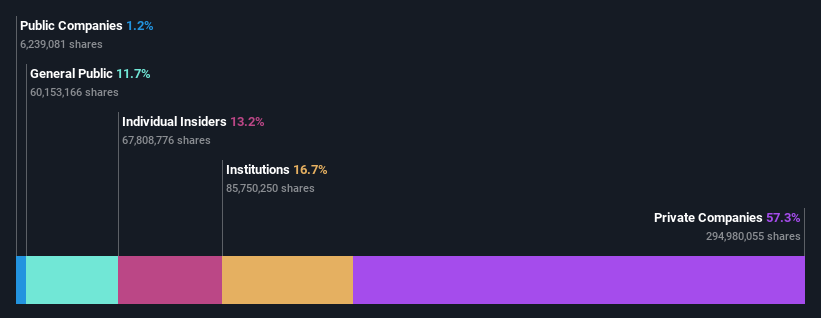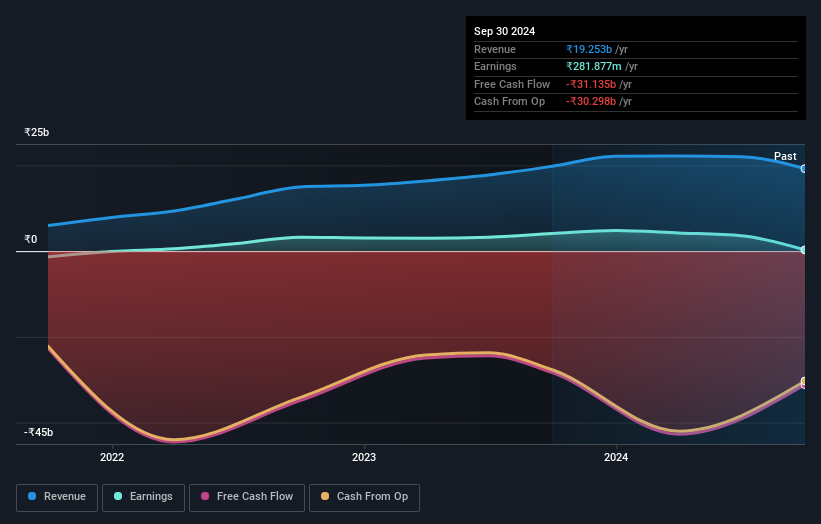ESAF Small Finance Bank's (NSE:ESAFSFB) market cap dropped ₹3.3b last week; individual investors who hold 57% were hit as were institutions

Key Insights
- Significant control over ESAF Small Finance Bank by private companies implies that the general public has more power to influence management and governance-related decisions
- ESAF Financial Holdings Private Limited owns 53% of the company
- Insiders own 13% of ESAF Small Finance Bank
To get a sense of who is truly in control of ESAF Small Finance Bank (NSE:ESAFSFB), it is important to understand the ownership structure of the business. And the group that holds the biggest piece of the pie are private companies with 57% ownership. In other words, the group stands to gain the most (or lose the most) from their investment into the company.
While institutions who own 17% came under pressure after market cap dropped to ₹22b last week,private companies took the most losses.
Let's take a closer look to see what the different types of shareholders can tell us about ESAF Small Finance Bank.
Check out our latest analysis for ESAF Small Finance Bank

What Does The Institutional Ownership Tell Us About ESAF Small Finance Bank?
Many institutions measure their performance against an index that approximates the local market. So they usually pay more attention to companies that are included in major indices.
ESAF Small Finance Bank already has institutions on the share registry. Indeed, they own a respectable stake in the company. This suggests some credibility amongst professional investors. But we can't rely on that fact alone since institutions make bad investments sometimes, just like everyone does. When multiple institutions own a stock, there's always a risk that they are in a 'crowded trade'. When such a trade goes wrong, multiple parties may compete to sell stock fast. This risk is higher in a company without a history of growth. You can see ESAF Small Finance Bank's historic earnings and revenue below, but keep in mind there's always more to the story.

We note that hedge funds don't have a meaningful investment in ESAF Small Finance Bank. ESAF Financial Holdings Private Limited is currently the largest shareholder, with 53% of shares outstanding. This essentially means that they have extensive influence, if not outright control, over the future of the corporation. Kadambelil Thomas is the second largest shareholder owning 6.1% of common stock, and Yusuffal Kader holds about 4.5% of the company stock. Kadambelil Thomas, who is the second-largest shareholder, also happens to hold the title of Chief Executive Officer.
Researching institutional ownership is a good way to gauge and filter a stock's expected performance. The same can be achieved by studying analyst sentiments. We're not picking up on any analyst coverage of the stock at the moment, so the company is unlikely to be widely held.
Insider Ownership Of ESAF Small Finance Bank
The definition of company insiders can be subjective and does vary between jurisdictions. Our data reflects individual insiders, capturing board members at the very least. Company management run the business, but the CEO will answer to the board, even if he or she is a member of it.
Insider ownership is positive when it signals leadership are thinking like the true owners of the company. However, high insider ownership can also give immense power to a small group within the company. This can be negative in some circumstances.
Our information suggests that insiders maintain a significant holding in ESAF Small Finance Bank. Insiders have a ₹2.9b stake in this ₹22b business. It is great to see insiders so invested in the business. It might be worth checking if those insiders have been buying recently.
General Public Ownership
The general public, who are usually individual investors, hold a 12% stake in ESAF Small Finance Bank. While this group can't necessarily call the shots, it can certainly have a real influence on how the company is run.
Private Company Ownership
We can see that Private Companies own 57%, of the shares on issue. It might be worth looking deeper into this. If related parties, such as insiders, have an interest in one of these private companies, that should be disclosed in the annual report. Private companies may also have a strategic interest in the company.
Next Steps:
While it is well worth considering the different groups that own a company, there are other factors that are even more important. Consider risks, for instance. Every company has them, and we've spotted 2 warning signs for ESAF Small Finance Bank you should know about.
Of course, you might find a fantastic investment by looking elsewhere. So take a peek at this free list of interesting companies.
NB: Figures in this article are calculated using data from the last twelve months, which refer to the 12-month period ending on the last date of the month the financial statement is dated. This may not be consistent with full year annual report figures.
Valuation is complex, but we're here to simplify it.
Discover if ESAF Small Finance Bank might be undervalued or overvalued with our detailed analysis, featuring fair value estimates, potential risks, dividends, insider trades, and its financial condition.
Access Free AnalysisHave feedback on this article? Concerned about the content? Get in touch with us directly. Alternatively, email editorial-team (at) simplywallst.com.
This article by Simply Wall St is general in nature. We provide commentary based on historical data and analyst forecasts only using an unbiased methodology and our articles are not intended to be financial advice. It does not constitute a recommendation to buy or sell any stock, and does not take account of your objectives, or your financial situation. We aim to bring you long-term focused analysis driven by fundamental data. Note that our analysis may not factor in the latest price-sensitive company announcements or qualitative material. Simply Wall St has no position in any stocks mentioned.
About NSEI:ESAFSFB
ESAF Small Finance Bank
Provides banking products and services to retail, rural, and corporate customers in India.
Adequate balance sheet second-rate dividend payer.

